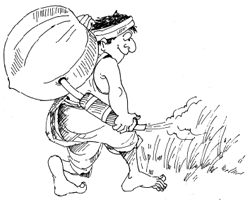Peaches and pests
 the harmless natural oil that gives peaches their perfume can also be used as a pesticide, scientists working for the us government have found. The oil kills fungus and other pests in the soil and could replace methyl bromide, a widely used pesticide that is toxic to humans and harms the ozone layer.
the harmless natural oil that gives peaches their perfume can also be used as a pesticide, scientists working for the us government have found. The oil kills fungus and other pests in the soil and could replace methyl bromide, a widely used pesticide that is toxic to humans and harms the ozone layer.
A compound similar to peach oil, called benzaldehyde, is manufactured synthetically. It is already used commercially in perfumes, flavourings, drugs and dyes. Scientists at the us Agricultural Research Service, along with researchers in South Africa and Israel, have been screening these natural chemicals for several years to see if they can substitute more dangerous human-made compounds. The essence of peach seems especially promising, said Charles L Wilson, plant pathologist at the Appalachian Fruit Research Station in Kearneysville, West Virginia. Wilson's team has developed a laboratory method for testing the peach extract against some of the pests for which methyl bromide is used. After the tests were successful, the scientists developed a new approach to apply benzaldehyde to soil, using granules of activated charcoal saturated with the fragrant chemical.
If field tests prove successful, the scientists hope it could be a significant breakthrough in ridding the world of methyl bromide. Like other chemicals such as chloroflorocarbons ( cfc s), methyl bromide is supposed to be phased out under the Montreal Protocol, a 1987 treaty. But, last year, bowing to protests by farmers who said that it was impossible for the us to end methyl bromide's use as scheduled in 2001, the Congress allowed industry to do so till the year 2005.
Despite the delay, its use next year is being curtailed by 25 per cent of 1990 levels, and is supposed to decrease rapidly over the next few years. This has alarmed many farmers, who use the chemical most extensively. Every year, they cover their fields with plastic suits and workers inject the gas under the sheets. Some of it soaks into the soil, while some escapes into the atmosphere.
Wilson said in an interview that he doubted that any single compound, such as peach oil, would be a "magic bullet' to replace methyl bromide. But he said he was optimistic that combinations of naturally occurring chemicals, along with other changes in farming methods, would provide important benefits.
"There is such a broad range of these things that exist in nature already,' he said. "The synthetic compounds were so powerful that we stopped looking for natural pesticides.' Wilson said oils of wintergreen and clove might also prove useful. Not only does the peach essence kill off pathogens, the researchers found, but it seems to favour other beneficial organisms in the soil that then continue to muscle out the unwanted pests.
Agricultural scientists have been exploring many different substitutes for methyl bromide, but most of them have been synthetic chemicals that, though they do not threaten the ozone layer, are not entirely harmless.
Kert Davies a researcher at the Environmental Working Group, which lobbies against pesticide use, said the burgeoning research into natural alternatives had broad implications for agriculture. "But replacing methyl bromide is like a moon mission,' he said. He criticised the agriculture department for not moving faster to come up with alternatives, and said some farmers have been reluctant to test alternatives because they find methyl bromide simpler to use, given that Congress is willing to extend its use.
